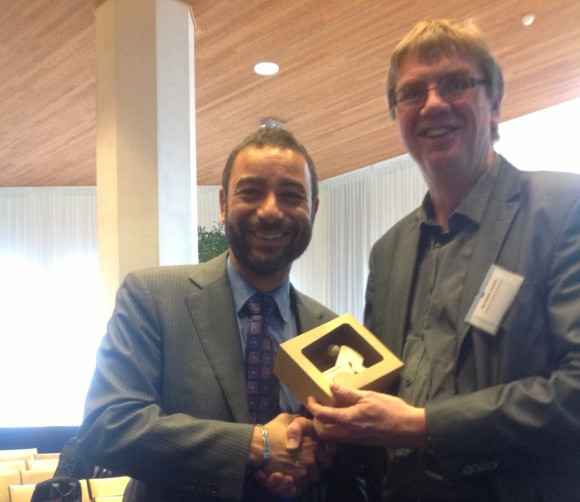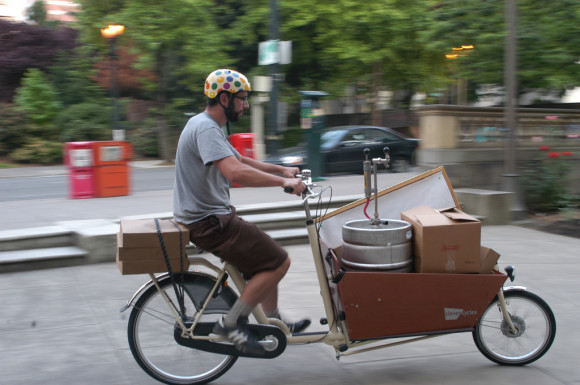
ECF takes CycleLogistics to the World Bank
Sustainable Urban Logistics has become a hot topic in development policy. The World Bank is not missing out on the trend and invited ECF Secretary Bernhard Ensink to a high-level conference to promote CycleLogistics.
Emerging countries like China, India and Brazil struggle with congestion and pollution problems due to the uncontrolled and unplanned growth of their transport and logistics sector. But many others are still up and coming, and the question is: how to avoid that they take the same unsustainable pathway out of poverty?
 ECF Secretary General Bernhard Ensink hands over a model cargo bike to Jeroen Haver of the Dutch Ministry of Infrastructure and the Environment.
ECF Secretary General Bernhard Ensink hands over a model cargo bike to Jeroen Haver of the Dutch Ministry of Infrastructure and the Environment.
How to improve sustainable logistics in developing countries?
To improve sustainable logistics practices in the developing world, private sector technologies and innovations, as well as governmental policies and academic knowledge need to be brought together. The World Bank Group and the Dutch government established the first Multi Donor Trust Fund for Sustainable logistics (MDTF-SL) in 2013 in order to fund activities on strategic themes in sustainable logistics that benefit low income and developing countries.
The conference on sustainable logistics, hosted by the Dutch Ministry of Foreign Affairs in The Hague, the first governmental donor to the fund, was a good occasion for ECF to promote Cyclelogistics. ECF Secretary General Bernhard Ensink was invited by the World Bank for an intervention on Cyclelogistics at the session on Urban Logistics.
“You can’t discuss sustainable logistics nowadays without paying attention to the potential transporting goods by bike has - at least at a conference in the Netherlands, one of the best cycling countries in the world. The Dutch word for cargobike is ‘bakfiets’ and it’s travelling around the world nowadays.”
Realizing the potential of transporting goods by bike
ECF is a key partner in the EU-cofunded CycleLogistics project. Meanwhile the project has become a vast source of knowledge and insight about Sustainable Urban Logistics, so much that its reputation nowadays even reaches the highest levels of International Development Policy. The most recent major study of the project showed that over 50% of urban goods trips could be handled by cycles.
“While we here in Europe are trying to get more of them onto our streets we see a trend, in Asia for instance, to drive cargo bikes off the streets”, says Bernhard Ensink. He says that we should make more efforts worldwide to raise the status of cyclelogistics as a modern, efficient and innovative part of sustainable logistics. “I hope that we can cooperate with other civil society organizations, the cycling industry and transport authorities to give a boost to cyclelogistics. It’s a global subject after all, transporting goods by bike can be a very efficient and accessible solution in Europe and in lower-income countries worldwide.”
The story of the Bakfiets continues
A perception that was confirmed at the conference by Professor Edgar Blanco from the Massachusetts Institute of Technology (MIT). He said that cargo bikes – including electric cargo bikes – could be a great solution for the logistical challenges in today’s Megacities.
The story of the ‘old’ Dutch Bakfiets, it seems, isn’t over yet. New generations of cargobikes took off already, not only in the Netherlands. Copenhagen is famous for the many Danish cargobikes. And the DHL Express delivery has replaced vans with cargobikes in their vehicle fleets.
When the different actors manage to work together worldwide, cyclelogistics has good chances to become a major trend in sustainable logistics.
Karsten Marhold works as Communications Assistant at the European Cyclists’ Federation. He has a masters degree in European history and cultures and is a researcher in European Integration in Brussels. His interests focus on cycling as a sustainable form of mobility and the corresponding EU policies.
- Log in to post comments
Contact the author
Recent news!
Upcoming events
Contact Us
Avenue des Arts, 7-8
Postal address: Rue de la Charité, 22
1210 Brussels, Belgium











